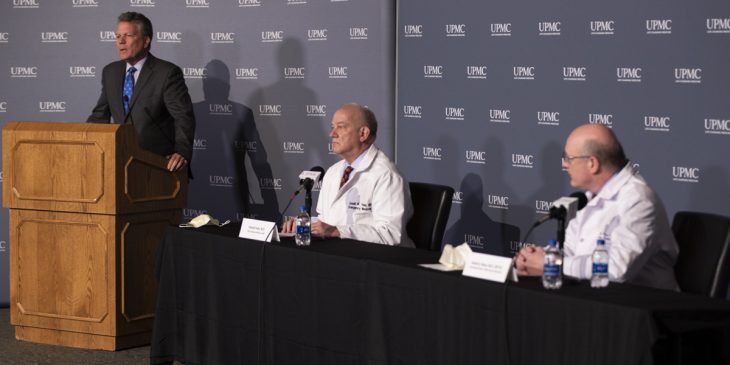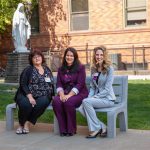UPMC Senior Communities haven’t seen any cases of COVID-19 among residents, despite the elderly being among the most vulnerable, UPMC officials shared at a press briefing today.
Early interventions, innovative precautions, enhanced screenings, fast testing and thorough training on use of personal protective equipment are contributors to UPMC’s success in keeping COVID-19 out of its long-term care and skilled nursing facilities, said Dr. David A. Nace, chief medical officer of UPMC Senior Communities.
“Before there was a single case of COVID-19 in the regions we serve, we put into place plans and precautions to protect our elderly residents,” said Nace, also president of AMDA, the Society for Post-Acute and Long-Term Care Medicine. “We’ve adjusted and added to these precautions as we’ve learned more.”
UPMC operates 36 senior living facilities in 21 Pennsylvania counties, providing secure and friendly surroundings for nearly 3,000 older adults.
Visitation restrictions, coupled with creative ways for families to stay connected with UPMC Senior Communities residents, such as video chats and drive-by parades, were among the first interventions the health system instituted to protect its long-term care residents.
These and other precautions implemented in a transparent fashion, with several virtual town-halls where staff, residents and families could ask questions and give feedback, were essential to the success of these measures, Nace said.
Across the country, the elderly and nursing home residents have been hit particularly hard by COVID-19, with the majority of Allegheny County’s COVID-19 deaths in long-term care residents, said Dr. Donald Yealy, chair of emergency medicine at UPMC. The median age of death from COVID-19 in Pennsylvania is 84, while the average U.S. life expectancy is 78.5.
“Nobody wants to think about our parents, grandparents and respected elders dying before their time,” said Yealy. “This is distressing, but also an opportunity to do better.”
The doctors said that UPMC is sharing the measures it has taken in its long-term care and assisted–living facilities with the hope that other facilities nationwide can replicate the health system’s success.
One of the more unique measures is setting 99 degrees Fahrenheit as the cut-off temperature for a UPMC Senior Communities resident to be considered feverish, rather than the more standard 100 degrees, because older adults have lower body temperatures and often don’t mount the same fever response as younger individuals. Elderly people with fevers are cared for with infection control precautions until clinicians are sure they do not have COVID-19.
Yealy said efforts like this that strategically protect the most vulnerable citizens should allow for a safe reopening of society and the economy.
“If we focus on the elderly, we will bring a death rate that is likely no more than 1% down to fractions of a percent,” Yealy said. “As others adopt these critically important measures UPMC is using, society should be able to move forward with far less restrictive, common sense precautions, such as frequent handwashing, staying home when sick and wearing masks or maintaining some physical distance in public areas.”
UPMC will be regularly updating the community on this developing situation. Follow UPMC News for updates.









